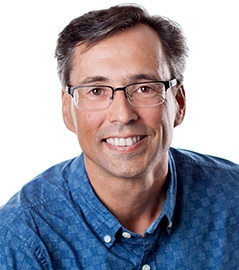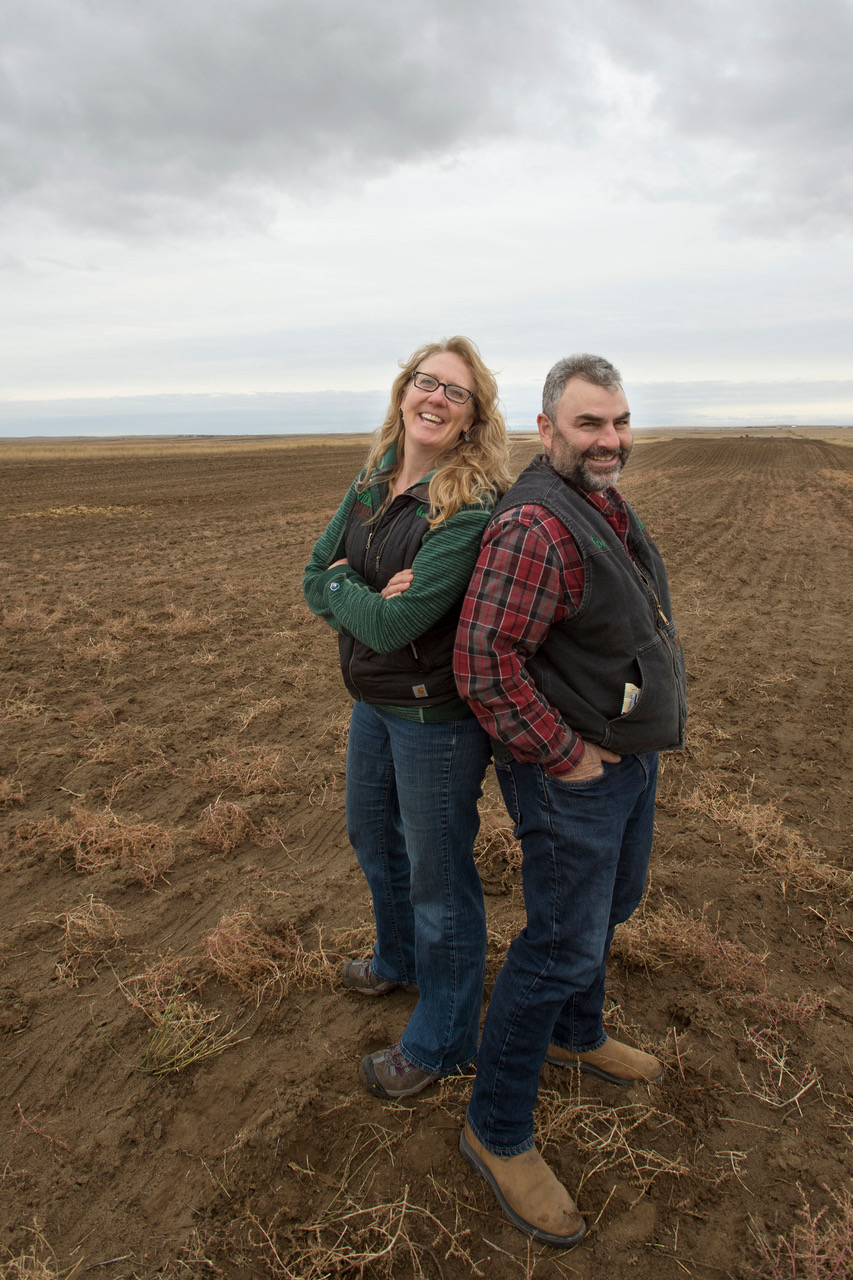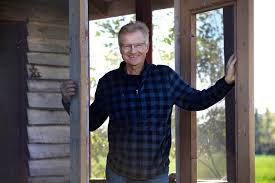
| Thursday, November 5, 2020- Online Program |
|
8:15-8:30am Welcome & Opening Remarks - Organic Connections Chair Marla Carlson 8:30-9:15am Bob Quinn- Taking Farming Back to the Future for Health, Prosperity and Fun BREAK 9:30-10:15am Don M. Huber, PhD, Professor Emeritus - Managing Nutrition to Control Plant Diseases and Pests BREAK 10:30-11:15am Chris Trump - Overview of the Complexity of the Interconnection Between Soil Microbial Life and Nutrient Uptake and Yield BREAK 11:30-12:15pm Dr. Andrew Hammermeister- Translating Organic Science into Practice 12:15pm Closing Remarks - Organic Connections Chair Marla Carlson |
| Friday, November 6, 2020- Online Program |
|
8:15-8:30am Welcome & Opening Remarks - Organic Connections Chair Marla Carlson 8:30-9:15am Doug Crabtree & Anna Jones-Crabtree - Defender of the Plough BREAK BREAK 10:30-11:15am Martin Entz, PhD - Improving Soil Health on Organic Farms Through Integrated Management Presenting with Myra Van Die, M.Sc. Student from Department of Plant Science, Univertsity of Manitoba BREAK 11:30-12:15pm Soil and Weeds Producer Panel Featuring Joe Wecker- Wecker Farms & Garry Richards- Richards Family Farm and Livestock Moderated by Dr. Andrew Hammermeister 12:15pm Closing Remarks - Organic Connections Chair Marla Carlson |
Click here for a pdf print copy of the program
Bob Quinn, PhD
Organic Farmer, AuthorBob Quinn grew up on a farm in Montana. After receiving a PhD in plant biochemistry, he returned to the farm in the late 70’s. Bob started Montana Flour & Grains Inc., and in 1986 that company introduced to the natural food industry an ancient grain similar to durum wheat. This grain was grown only organically and marketed under his own brand name, Kamut. In 1986 Bob planted his first organic certified crop on his own farm and was farming the entire farm organically by 1989. Bob Quinn grew up on a farm in Montana. After receiving a PhD in plant biochemistry, he returned to the farm in the late 70’s. Bob started Montana Flour & Grains Inc., and in 1986 that company introduced to the natural food industry an ancient grain similar to durum wheat. This grain was grown only organically and marketed under his own brand name, Kamut. In 1986 Bob planted his first organic certified crop on his own farm and was farming the entire farm organically by 1989. Over the course of his lifetime, Bob has won many awards, including AERO's Sustainable Ag Award, a lifetime of service award from the Montana Organic Association, and the national Organic Pioneer Award from the Rodale Institute in Pennsylvania. He has also been a member of the Organic Trade Association (OTA) since 1987 and is a member of their farm advisory committee (FAC) and in 2010, received their National Organic Leadership award. Bob continues to promote organic and sustainable agriculture, locally produced food and fuel as well as promoting the idea that food should be our medicine and medicine should be our food. |
|
Dr. Don M. Huber, B.S., M.S. and PhD
Professor Emeritus of Plant Pathology at Purdue UniversityDr. Don M. Huber holds B.S. and M.S. degrees from the University of Idaho (1957, 1959), a PhD from Michigan State University (1963), and is a graduate of the US Army Command & General Staff College, Industrial College of the Armed Forces, and National Security Program. He was Cereal Pathologist at the University of Idaho for 8 years before joining the Department of Botany & Plant Pathology at Purdue University in 1971. His agricultural research the past 55 years has focused on the epidemiology and control of soilborne plant pathogens with emphasis on microbial ecology, cultural and biological controls, nutrient-disease interactions, pesticide-disease interactions, physiology of host-parasite relationships and techniques for rapid microbial identification. Dr. Huber has had several concurrent careers including 14 years as a professional labor-relations conciliator with 7 years service on the Indiana Education Employment Relations Board as a Mediator/Fact-Finder/Conciliator. He retired in 1995 as Associate Director of the Armed Forces Medical Intelligence Center (Colonel) after 41years of active and reserve military service during which time he also commanded A strategic Medical Intelligence Detachment for 8 years with the US Army Medical Intelligence and Information Agency and Office of the Surgeon General. Dr. Huber is a past Chairman of the USDA-APS National Plant Disease Recovery System; a member of the US Threat Pathogens Committee; former member of the Advisory Board for the Office of Technology Assessment, U.S. Congress (now Congressional Research Service); and Global Epidemiology and Quadripartite Medical Working Groups of the Office of the US Surgeon General (OTSG). He is author or co-author of over 300 journal articles, Experiment Station Bulletins, book chapters and review articles; three books, and 84 special invited publications; and an active scientific reviewer; speaker; consultant to academia, industry, and government; and international research cooperator. |
|
Chris Trump
Korean Natural Farmer & EducatorChris Trump is a world-renowned Korean Natural Farmer and the first to implement KNF on a large-scale. He was raised on an 800-acre macadamia nut farm in on The Big Island of Hawaii and managed the farm from 2009 - 2018. While managing the farm he lead it through the process to convert to a certified organic farm using exclusively natural farming inputs made on farm. This farm has had its most profitable years in a 30 year existence in the last four years. Chris’ formal education is a degree in biblical studies. His journey into the study of the microbiological world began at college and over the last 12 years he has spent a great deal of time partnering with universities for research and studying with some of the most innovative minds in agriculture in our generation. Chris is the leading US protege of Cho Han Kyu, the creator of Korean Natural Farming. He is also a close friend of Dr. Elaine Ingham who trained him in mycroscopy. Chris currently advises the PhD program at Konkuk University, South Korea’s leading agricultural program. Chris teaches online and has reached one million viewers with online agricultural education. He also sits on the International R&D board for the International Macadamia Nut Association. Chris Trump is a world-renowned Korean Natural Farmer and the first to implement KNF on a large-scale. He was raised on an 800-acre macadamia nut farm in on The Big Island of Hawaii and managed the farm from 2009 - 2018. While managing the farm he lead it through the process to convert to a certified organic farm using exclusively natural farming inputs made on farm. This farm has had its most profitable years in a 30 year existence in the last four years. Chris’ formal education is a degree in biblical studies. His journey into the study of the microbiological world began at college and over the last 12 years he has spent a great deal of time partnering with universities for research and studying with some of the most innovative minds in agriculture in our generation. Chris is the leading US protege of Cho Han Kyu, the creator of Korean Natural Farming. He is also a close friend of Dr. Elaine Ingham who trained him in mycroscopy. Chris currently advises the PhD program at Konkuk University, South Korea’s leading agricultural program. Chris teaches online and has reached one million viewers with online agricultural education. He also sits on the International R&D board for the International Macadamia Nut Association. |
|
Dr. Andrew Hammermeister, B.Sc. and M.Sc.
Director of the Organic Agriculture Centre of Canada (OACC) and Associate Professor in the Faculty of Agriculture, Dalhousie UniversityHe has a B.Sc. in Agriculture specializing in Soil Science from the University of Saskatchewan, M.Sc. in Land Reclamation and Ph.D. in Applied Ecology from the University of Alberta. Andrew has worked with the OACC since 2002, collaborating in research on grain, vegetable and fruit cropping systems, exploring soil fertility and weed management. Most recently he has been studying, small bush fruits such as haskap, landscape biodiversity, and applications of smart technologies to organic agriculture. Andrew is the Science Director for the Organic Science Cluster, the coordinated national initiative for organic agricultural research in Canada. Visit www.dal.ca/oacc for more information. He sits on the national organic standards review committee and several other organic sector committees. |
|
Doug Crabtree & Anna Jones-Crabtree
Owner/Operators at Vilicus FarmsVilicus Farms is a first generation, organic, 9,600 acre dryland crop farm in Northern Hill County, Montana growing a diverse array of organic heirloom and specialty grain, pulse, oilseed and broadleaf crops under five and seven-year rotations with integrated cover cropping. In eleven seasons, Vilicus Farms grew from 1,280 acres to a 9,600 acre nationally recognized farm by using USDA’s beginning farmer programs, employing extensive conservation practices, and fostering unique risk sharing relationships with food companies and land investment firms. With over 26% of their land in non-crop conservation and 400 acres seeded to native pollinator habitat Vilicus Farms became Bee Better certified in 2019. Vilicus Farms is a first generation, organic, 9,600 acre dryland crop farm in Northern Hill County, Montana growing a diverse array of organic heirloom and specialty grain, pulse, oilseed and broadleaf crops under five and seven-year rotations with integrated cover cropping. In eleven seasons, Vilicus Farms grew from 1,280 acres to a 9,600 acre nationally recognized farm by using USDA’s beginning farmer programs, employing extensive conservation practices, and fostering unique risk sharing relationships with food companies and land investment firms. With over 26% of their land in non-crop conservation and 400 acres seeded to native pollinator habitat Vilicus Farms became Bee Better certified in 2019. |
|
Dr. Patrick Carr
Superintendent of Central Agricultural Research Center, Montana State UniversityDr. Carr is superintendent of the Montana State University, Central Agricultural Research Center, where he conducts dryland organic farming research. Prior to returning to Montana in 2016, Dr. Carr directed a dryland research program at North Dakota State University, where he also conducted dryland organic farming research, beginning in the late 1990s. He is past chair of the Organic Management Systems Division and the Organic Management Systems Community within the American Society of Agronomy and presently is the at-large representative on the Montana Organic Commodity Advisory Council with the Montana Department of Agriculture. He was awarded the Organic Achievement Award from the American Society of Agronomy’s Organic Management Systems Community in 2019, and is a past recipient (2007) of the Friend of the Farmer Award given by the Northern Plains Society Agriculture Society. |
|
Martin Entz, PhD
Professor in the Department of Plant Science, University of ManitobaHe received his PhD from the University of Saskatchewan in 1988 and worked as a farm manager and research agronomist before embarking on his academic career. “The goal of my program is to discover new ways of farming ecologically, and to empower farmers with knowledge and other tools required to design sustainable farming systems adapted to where they live. Farmers are active partners in many of my graduate student’s projects”. He leads the Glenlea Long-Term Rotation Study – Canada’s oldest organic vs conventional farming systems experiment, which just completed its 28th season. Since 2011, Martin has involved Canadian organic farmers directly in the development of crop varieties for organic production in partnership with USC Canada and Agriculture and AgriFood Canada. Martin teaches three courses including “Organic production on the Prairies”. He has an active graduate student program, and for the past two years hosted a “Summer institute for development agronomists” at the U of M Carman campus. Martin has led projects in Central America, Zimbabwe, NW China and North Korea and his team currently provides science support to the Canadian Foodgrains Bank’s East Africa conservation agriculture program. Martin is part of Sustainable Canada Dialogues, a group of 60 Canadian scholars who propose evidence-based climate solutions and actions.Martin’s life is further enriched by a supportive and adventurous family. |
|
Joe Wecker
Owner/Operator- Wecker FarmsJoe along with his wife Wendy, their three children and his parents, operate a certified organic grain farm in the Regina Plains. After many years of conventional farming, the Weckers saw the damage that was being done to the soil and ecosystem and made the choice to work alongside nature in an organic cropping system. Currently they use a system of Nutrition Farming where they strive to optimize the health of their plants by applying micronutrients as needed. They also use organic soil amendments, such as compost extract, fish fertilizer, kelp, molasses and humates to stimulate the biology in the soil. They have a diverse crop rotation that includes up to 13 different crops, many of which are intercropped. They also use companion crops and cover crops on nearly the entire farm. Joe along with his wife Wendy, their three children and his parents, operate a certified organic grain farm in the Regina Plains. After many years of conventional farming, the Weckers saw the damage that was being done to the soil and ecosystem and made the choice to work alongside nature in an organic cropping system. Currently they use a system of Nutrition Farming where they strive to optimize the health of their plants by applying micronutrients as needed. They also use organic soil amendments, such as compost extract, fish fertilizer, kelp, molasses and humates to stimulate the biology in the soil. They have a diverse crop rotation that includes up to 13 different crops, many of which are intercropped. They also use companion crops and cover crops on nearly the entire farm. |
|
|
Garry Richards Owner/Operator- Richards Family Farm & LivestockGarry, his wife Lynn, and their 3 children, Rebekah, Evan, and Caroline operate a mixed grain and cattle farm in the Bangor area. Their goal is to have a resilient, low risk, profitable farm that creates healthy food, healthy ecosystems, and healthy people. They use cover crops, perennial forage, intercropping, planned grazing, and enterprise integration to try to try and produce these results. |















